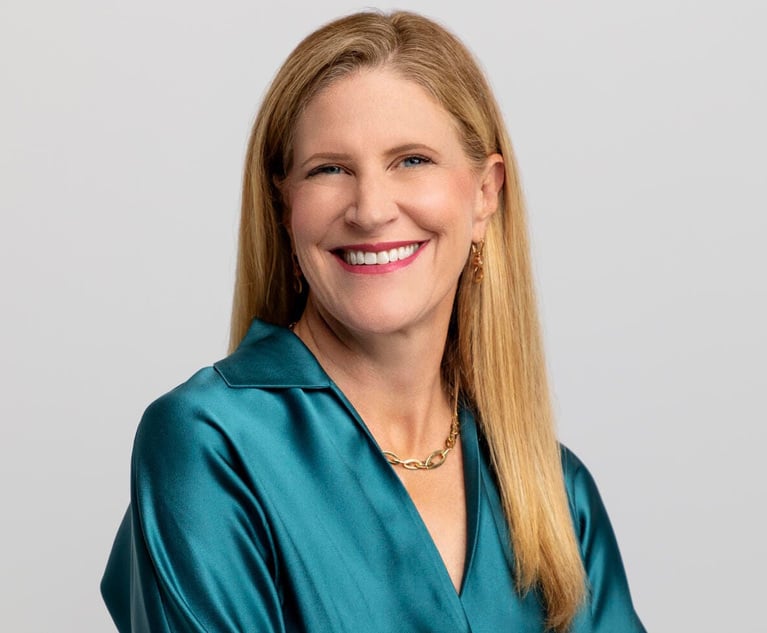Wells Fargo, Goldman Sachs Fight Off Activists' Climate Change Resolutions
In-house lawyers at Wells Fargo and Goldman Sachs have successfully fought off climate-related proxy resolutions sought by activist investors with the U.S. Securities and Exchange Commission recently granting the banks' motions to exclude the resolutions from shareholder consideration.
March 19, 2019 at 07:38 PM
5 minute read
 Photo: Nicky Loh/Bloomberg
Photo: Nicky Loh/Bloomberg
The in-house lawyers at San Francisco-based Wells Fargo & Co. and New York City-based Goldman Sachs have successfully fought off climate-related proxy resolutions sought by activist investors.
The proposed resolutions asked the banks to work to reduce the full carbon footprint of their loan and investment portfolios in line with the 2015 Paris Agreement on global warming.
But the U.S. Securities and Exchange Commission recently granted the banks' motions to exclude the resolutions from shareholder consideration. A number of other banks in the world have already committed to decrease the climate impact of their loans in accord with the Paris goals.
But since the U.S. does not accept the Paris agreement, most U.S. banks have committed to lowering their own operations' footprints but not to reducing loans or investments in fossil fuel companies.
For example, Wells Fargo has promised $200 billion in financing through 2030 to businesses that support the transition to a low-carbon economy, including $100 billion toward clean technology and renewable energy projects. Goldman has committed to financing and investing in clean energy with an expanded target of $150 billion by 2025.
Attorney Danielle Fugere, president of the nonprofit group As You Sow, which promotes environmental and social corporate responsibility, said Tuesday she was disappointed in the SEC's decision and in the banks. Investing in clean technology is not enough, she said.
“What we have found with these banks is they are reducing their own carbon footprints, but are ignoring the impact of their investments in fossil fuels,” Fugere explained. “Every dollar invested in fossil fuel infrastructure lives on for many years.”
Wells Fargo declined to comment Tuesday, and Goldman Sachs did not immediately respond to messages.
Fugere said the group picked just two of the largest U.S. banks to test the waters with resolutions, because last year the SEC surprisingly ruled against a climate change proxy proposal. “So we were not surprised this year, but it is very disappointing and of significant concern.”
From a legal position, she said she does not agree with the recent rulings. “We believe the commission has said in the past it is important for shareholders to raise important issues to be discussed as long as they are not micromanaging the company. We think the SEC staff is not interpreting the commission's directive appropriately.”
The two resolutions were similar in asking the banks to measure the carbon content of their portfolios and decrease the climate impact of their loans.
They cited over a dozen banks that have adopted policies to end or significantly reduce financing for Arctic oil or tar sands projects. In addition, BNP Paribas in Paris also phased out business with companies tied to shale development and coal energy. And the World Bank has committed to end upstream oil and gas financing for exploration and production.
In contrast, the resolution said Wells Fargo has increased investments in the dirtiest fuels in each of the past three years, including tar sands, Arctic oil and coal. The Goldman resolution said between 2015 and 2017 that the bank invested nearly $9 billion into financing of tar sands, Arctic oil, and coal; and last year it added coal loans to its portfolio.
The SEC's letter rejecting the Goldman resolution was sent March 12 to Beverly O'Toole, the bank's associate general counsel for corporate governance. It said, “In our view, the proposal would require the company to manage its lending and investment activities in alignment with the goals of the 2015 Paris Climate Agreement of maintaining global warming well below 2 degrees Celsius.”
The Division of Corporation Finance decision said that by imposing “this overarching requirement, the proposal would micromanage the company by seeking to impose specific methods for implementing complex policies in place of the ongoing judgments of management as overseen by its board of directors.” The decision was signed by special counsel Courtney Haseley.
The Wells Fargo rejection letter was sent March 5 to Elizabeth Ising, a securities partner at Gibson, Dunn & Crutcher, who works closely with Willie White, senior counsel and assistant corporate secretary at Wells Fargo.
The Wells Fargo decision carried essentially the same wording. It was signed by special counsel Kasey Robinson.
Fugere said shareholders can see the problem with the risk of global warming impacting their holdings, “but the SEC is saying 'no, you may not raise these important issues.'“ She cited the Pacific Gas & Electric Co. wildfires in California, and the company's subsequent bankruptcy.
If the planet is to meet its global warming goals and avoid more climate catastrophes, Fugere said, “then it is critical that banks be a part of the solution.”
This content has been archived. It is available through our partners, LexisNexis® and Bloomberg Law.
To view this content, please continue to their sites.
Not a Lexis Subscriber?
Subscribe Now
Not a Bloomberg Law Subscriber?
Subscribe Now
NOT FOR REPRINT
© 2025 ALM Global, LLC, All Rights Reserved. Request academic re-use from www.copyright.com. All other uses, submit a request to [email protected]. For more information visit Asset & Logo Licensing.
You Might Like
View All
Former Capital One Deputy GC Takes Legal Reins of AIG Spinoff

Class Certification, Cash-Sweep Cases Among Securities Litigation Trends to Watch in 2025
6 minute read
Ex-Six Flags CLO Lands New C-Suite Post—This Time as HR Chief

After 2024's Regulatory Tsunami, Financial Services Firms Hope Storm Clouds Break
Trending Stories
Who Got The Work
Michael G. Bongiorno, Andrew Scott Dulberg and Elizabeth E. Driscoll from Wilmer Cutler Pickering Hale and Dorr have stepped in to represent Symbotic Inc., an A.I.-enabled technology platform that focuses on increasing supply chain efficiency, and other defendants in a pending shareholder derivative lawsuit. The case, filed Oct. 2 in Massachusetts District Court by the Brown Law Firm on behalf of Stephen Austen, accuses certain officers and directors of misleading investors in regard to Symbotic's potential for margin growth by failing to disclose that the company was not equipped to timely deploy its systems or manage expenses through project delays. The case, assigned to U.S. District Judge Nathaniel M. Gorton, is 1:24-cv-12522, Austen v. Cohen et al.
Who Got The Work
Edmund Polubinski and Marie Killmond of Davis Polk & Wardwell have entered appearances for data platform software development company MongoDB and other defendants in a pending shareholder derivative lawsuit. The action, filed Oct. 7 in New York Southern District Court by the Brown Law Firm, accuses the company's directors and/or officers of falsely expressing confidence in the company’s restructuring of its sales incentive plan and downplaying the severity of decreases in its upfront commitments. The case is 1:24-cv-07594, Roy v. Ittycheria et al.
Who Got The Work
Amy O. Bruchs and Kurt F. Ellison of Michael Best & Friedrich have entered appearances for Epic Systems Corp. in a pending employment discrimination lawsuit. The suit was filed Sept. 7 in Wisconsin Western District Court by Levine Eisberner LLC and Siri & Glimstad on behalf of a project manager who claims that he was wrongfully terminated after applying for a religious exemption to the defendant's COVID-19 vaccine mandate. The case, assigned to U.S. Magistrate Judge Anita Marie Boor, is 3:24-cv-00630, Secker, Nathan v. Epic Systems Corporation.
Who Got The Work
David X. Sullivan, Thomas J. Finn and Gregory A. Hall from McCarter & English have entered appearances for Sunrun Installation Services in a pending civil rights lawsuit. The complaint was filed Sept. 4 in Connecticut District Court by attorney Robert M. Berke on behalf of former employee George Edward Steins, who was arrested and charged with employing an unregistered home improvement salesperson. The complaint alleges that had Sunrun informed the Connecticut Department of Consumer Protection that the plaintiff's employment had ended in 2017 and that he no longer held Sunrun's home improvement contractor license, he would not have been hit with charges, which were dismissed in May 2024. The case, assigned to U.S. District Judge Jeffrey A. Meyer, is 3:24-cv-01423, Steins v. Sunrun, Inc. et al.
Who Got The Work
Greenberg Traurig shareholder Joshua L. Raskin has entered an appearance for boohoo.com UK Ltd. in a pending patent infringement lawsuit. The suit, filed Sept. 3 in Texas Eastern District Court by Rozier Hardt McDonough on behalf of Alto Dynamics, asserts five patents related to an online shopping platform. The case, assigned to U.S. District Judge Rodney Gilstrap, is 2:24-cv-00719, Alto Dynamics, LLC v. boohoo.com UK Limited.
Featured Firms
Law Offices of Gary Martin Hays & Associates, P.C.
(470) 294-1674
Law Offices of Mark E. Salomone
(857) 444-6468
Smith & Hassler
(713) 739-1250






